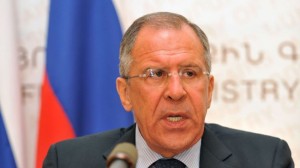 Russians Foreign Minister Sergei Lavrov says the recent historic nuclear deal with Iran eliminates the need for a missile defense system in Europe.
Russians Foreign Minister Sergei Lavrov says the recent historic nuclear deal with Iran eliminates the need for a missile defense system in Europe.�We have noticed that, if the agreement that has been reached is fully realized, if the Iranian nuclear problem is fully resolved, �the reasons that are now given for the creation of the European segment of the missile defense system will become invalid,� Lavrov said in Brussels on Wednesday.
�My colleagues said they are satisfied with the progress, even a breakthrough in the situation with the Iranian nuclear program,� the Russian minister said.
On November 24, Iran and the five permanent members of the United Nations Security Council -- the United States, Russia, France, China, and Britain -- plus Germany sealed an agreement to lay the groundwork for the full resolution of the West�s decade-old dispute with Iran over its nuclear energy program.
In exchange for Tehran�s confidence-building measure to limit certain aspects of its nuclear activities, the Sextet agreed to lift some of the existing sanctions against the Islamic Republic.
American officials have said the missile defenses they want to install in Europe will protect NATO allies and counter any threat from Iran. Russia has long opposed the plan, and sees the system as a threat to the viability of Russia's own nuclear arsenal as a deterrent.
German Foreign Minister Guido Westerwelle, also highlighted a connection between Iran�s nuclear issue and the missile defense system.
"The more progress we make together on the Iranian nuclear program, the greater the consequences are with regard to the missile defense program ... and the chances of overcoming problems [with Russia],� Westerwelle said.
Russia remains opposed to a US plan to install defense missile system in Europe.
KA/HGH
Russians Foreign Minister Sergei Lavrov says the recent historic nuclear deal with Iran eliminates the need for a missile defense system in Europe.
�We have noticed that, if the agreement that has been reached is fully realized, if the Iranian nuclear problem is fully resolved, �the reasons that are now given for the creation of the European segment of the missile defense system will become invalid,� Lavrov said in Brussels on Wednesday.
�My colleagues said they are satisfied with the progress, even a breakthrough in the situation with the Iranian nuclear program,� the Russian minister said.
On November 24, Iran and the five permanent members of the United Nations Security Council -- the United States, Russia, France, China, and Britain -- plus Germany sealed an agreement to lay the groundwork for the full resolution of the West�s decade-old dispute with Iran over its nuclear energy program.
In exchange for Tehran�s confidence-building measure to limit certain aspects of its nuclear activities, the Sextet agreed to lift some of the existing sanctions against the Islamic Republic.
American officials have said the missile defenses they want to install in Europe will protect NATO allies and counter any threat from Iran. Russia has long opposed the plan, and sees the system as a threat to the viability of Russia's own nuclear arsenal as a deterrent.
German Foreign Minister Guido Westerwelle, also highlighted a connection between Iran�s nuclear issue and the missile defense system.
"The more progress we make together on the Iranian nuclear program, the greater the consequences are with regard to the missile defense program ... and the chances of overcoming problems [with Russia],� Westerwelle said.
Russia remains opposed to a US plan to install defense missile system in Europe.
By Press TV
The Iran Project is not responsible for the content of quoted articles.










